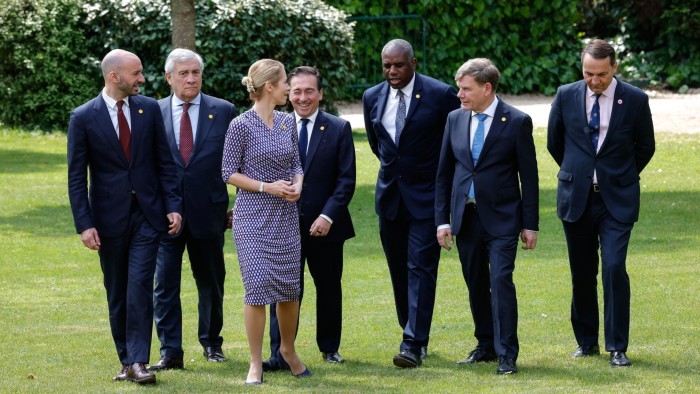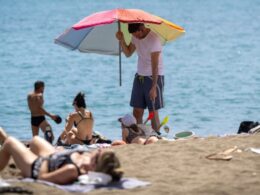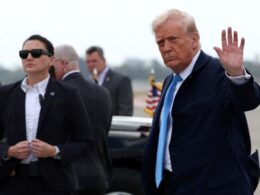Good morning. News to start: Brussels is drawing up proposals to use capital controls and trade tariffs to maintain sanctions on Russia if Hungary blocks their extension in July, officials briefed on the ongoing discussions with member states told the Financial Times.
Today, I delve into the other ways the EU is working on its sanctions programme to maintain pressure on Moscow, while our tech correspondent reports on an initiative to create an EU digital conglomerate modelled on Airbus.
Sanctions web
EU capitals are set to agree on the bloc’s 17th package of Russia sanctions tomorrow, and have already begun discussing further measures against the country’s energy and banking sectors should Moscow fail to agree to a ceasefire in its war against Ukraine.
Context: Alongside military supplies to Kyiv, sanctions have been one of the key planks of the EU’s response to Russia’s full-scale war that began in February 2022. Vast swaths of Russia’s economy are under EU restrictions, in addition to trade bans and measures targeting oligarchs and politicians.
Ambassadors from the EU’s 27 member states largely agreed on the latest batch of measures yesterday, according to diplomats, and are set to give their final endorsement tomorrow. That would mean foreign ministers could legally approve them next week.
But capitals are already talking about what more could be done, and quickly, in order to make good on a threat made this weekend by Kyiv’s western allies — including the US — to impose “massive sanctions” on Moscow if it rejected a 30-day ceasefire proposal.
“What we are preparing are additional sanctions which target the energy and financial sector. We asked this weekend for the European Commission to prepare new, more important sanctions to force Russian President Vladimir Putin [towards] peace logic,” French foreign minister Jean-Noël Barrot said yesterday.
“We are preparing powerful and massive sanctions if [Putin] doesn’t accept a ceasefire,” Barrot added.
It’s the US element that is accelerating the EU’s plans. Officials say that if Donald Trump’s administration, which has thus far been more sympathetic to Moscow, were to impose new sanctions on Russia, Brussels would need to be ready to rapidly follow suit.
Also, if the US were to support new sanctions (or better still, sanctions co-ordinated with the EU and the UK), that would put enormous pressure on Trump-aligned Hungary, which has in the past routinely tried to block, weaken or slow down restrictions targeting Moscow.
Officials caution that the talks on new sanctions are preliminary and there are no concrete measures being circulated. And, they admit, much depends on how the next few days of diplomacy between the US, Russia and Ukraine unfold.
“It all depends on how the US behaves, to be honest,” said one of the officials. “If they are angry enough at Russia to put more sanctions on the table, we would have a green light to go even harder too.”
Chart du jour: Capital markets disunion
Rich in savings, Europe struggles to fund its future as its best companies look to the deep-pocketed US capital market instead of seeking backing at home.
AI Airbus
The EU should pool public and private financing in the so-called “Airbus model” to boost its digital infrastructure, experts and European officials suggest in a new initiative previewed by Barbara Moens.
Context: Europe is trying to reduce its reliance on American tech and services. Expanding digital infrastructure is key for building the EU’s tech sovereignty, including cloud capabilities, chips, and artificial intelligence.
The proposal, launched today and seen by the FT, draws inspiration from Airbus, a pan-European initiative from the 1970s to take on the American Boeing’s domination in aviation.
In the paper, European officials, researchers and tech representatives argue that Europe should replicate the Airbus approach and combine national efforts to scale up homegrown tech firms in areas where the EU already has strong capabilities.
One example given by Kai Zenner, one of the authors, is a European supply chain for AI devices, in which Dutch semiconductor company ASML, British firm ARM Holding and the Swiss-based STMicroelectronics could produce and design chips, which would then be integrated into smart factory and industrial systems built by German manufacturer Siemens.
This could allow hosting applications closer to its end users, instead of relying too heavily on US-based cloud platforms. Similar coalitions could be created in other semiconductor projects, or domains such as quantum computing, space and connectivity, the authors argue.
In this way, the EU should move away from being a “digital colony” to developing its own digital infrastructure, which would also better protect its critical infrastructure against foreign pressure or threats, argue the authors.
What to watch today
-
EU finance ministers meet.
-
Informal meeting of EU energy ministers in Warsaw.
-
EU Council president António Costa meets Serbian President Aleksandar Vučić in Belgrade.
Now read these
Are you enjoying Europe Express? Sign up here to have it delivered straight to your inbox every workday at 7am CET and on Saturdays at noon CET. Do tell us what you think, we love to hear from you: europe.express@ft.com. Keep up with the latest European stories @FT Europe









